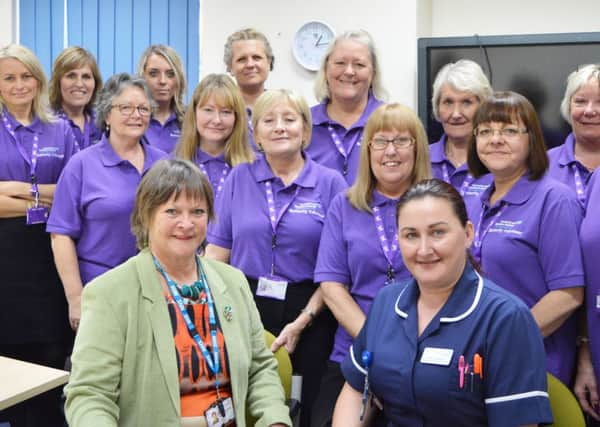Butterfly volunteers at Doncaster Royal Infirmary are big success


Butterfly volunteers, who began to be seen on wards in August 2017, were introduced by the local Hospital Trust to comfort patients at the end of life.
Proving to be a hugely successful addition to the team, the volunteers spend time with patients when medical and clinical staff cannot. They will sit and talk, run errands and also help the patient’s loved ones, giving them valuable time to be able to go home for a few hours, safe in the knowledge that their friend, parent, child or significant other is not alone.
Advertisement
Hide AdAdvertisement
Hide AdLast year the Royal College of Nursing released a study which described how many hospital patients were dying alone, due to the time constraints facing clinical and medical staff. Recognising that more should be done for palliative patients and their families, the End of Life Care Team at Doncaster and Bassetlaw Teaching Hospitals (DBTH), have been working hard to improve the experience of those in the final stages of life.
Julie Taylor is one of 14 volunteers currently at the Trust and she said: “I believe that this is one of the most important things I have ever done and I really consider it a privilege to spend time with patients during their final moments.
“While you often think of this time as being very sad, there is such warmth being shared by families and friends and being able to help during this time is hugely rewarding. When patients are very poorly, often they just want company and to know that they are not alone. Whether this is holding their hand, chatting with them or simply being there, it is a very humbling experience.”
The Trust have adopted the image of a butterfly due to its close symbolism with endurance, change and renewal, making this association to end of life care as well as the profound effect this has on the patient and their family and loved ones.
Advertisement
Hide AdAdvertisement
Hide AdEnd of Life coordinator at the Trust, Karen Lanaghan, said: “We will all be affected by death at some point and as a hospital it is our duty to ensure that we get this aspect of care right, treating the patient with dignity and respect. Due to the challenges we face as a health service, we can often view a patient as a series of symptoms, rather than someone with hopes, desires and fears.”